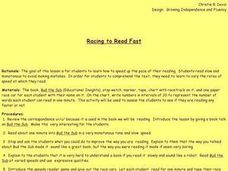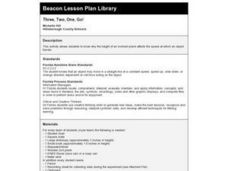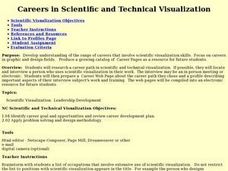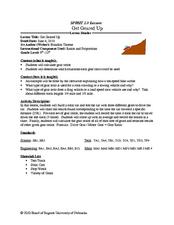Curated OER
Racing to Read Fast
Students identify and interpret how to speed up the pace of their reading. Then they read slow and monotonous to avoid making mistakes. Students also read to comprehend the text that they need to identify to vary the rates of speed at...
Curated OER
Reading Race
First graders observe how the first sentence of a story is read very slowly and can be read faster and with more expression. They then read the same book three times to become more familiar with the words in the book and then read it...
Curated OER
Get Ready to Race!
Student increase their reading fluency through the use of various strategies. After reviewing decoding and rereading, students complete an initial read of a novel text. Working with a partner, they read complete a timed assessment of...
Curated OER
Newton's 2nd Law
Fourth graders discuss Newton's Second Law of Motion, and the acceleration of fast and slow moving objects. They experiment with items with different masses to determine the effect mass has on acceleration using a toy car. They complete...
Curated OER
Race To Finish
Students increase their reading fluency through the use of various strategies. After reviewing cross checking and rereading, students complete an initial read of a novel text. Working with a partner, they read complete a timed assessment...
Curated OER
The Only Superstitious Person Is Huck Finn
Fourth graders interview people from three different age groups about superstition including what they believe and why they believe it. This lesson goes along with the classic book, The Adventures of Huckleberry Finn.
Curated OER
Newton in Motion Project
Students investigate Newton's Third Law of Motion as it exits in real world applications. They watch as the teacher makes a simple balloon powered car before explaining how the motion of the car demonstrates Newton's Third Law of Motion....
Curated OER
A Tall Ship and a Star to Steer Her By
Young scholars create a water transportation device powered by wind. In this wind power lesson, students research transportation concepts after reading the poem "Sea Fever" by John Masefield. Young scholars design the fastest sailboat...
Curated OER
Slippery Slope
Students define patterns, relation and function. In this algebra lesson, students find the slope of a line and write equations of line. They model the slope using real life scenarios.
Curated OER
Speedy Reader
Young scholars practice the fluency of their reading by incorporating a variety of techniques and strategies. They read with stop watches and analyze "In the Big Top" and "Charlie," by Richard Vaughan. Students race and record their...
Curated OER
A South African Storm
Learners read "A South African Storm" by Allison Howard and participate in a class discussion that examines Howard's letter for both content and writing form. They write a letter using some of the techniques they identified in Howard's.
Curated OER
Animal Artists
Students read a current events non-fiction article and answer vocabulary and comprehension questions about it. In this animal artists paint for fun lesson plan, students also work on dictionary skills, geography, and creative thinking by...
Curated OER
Three, Two, One, Go!
Students work in teams conducting an experiment that demonstrates why the height of an inclined plane affects the speed at which an object travels. They record data on a chart and calculate speed to reveal the results of three trials at...
Curated OER
Careers in Scientific and Technical Visualization
Students research a career path in scientific and technical visualization. They prepare a Career Web Page about the career path they chose. The web pages be compiled into an electronic resource for future students.
Curated OER
Get Geared Up
Middle schoolers calculate gear ratio as they solve word problems. They discuss and find slopes as they relate to real life. Additionally, they hey use ratio and proportion to make predictions and solve problems.
Curated OER
C.M. Beg
First graders are introduced to a pretend boy named C.M. Beg. The initials of the boy be a mnemonic device to help students explain the basic characteristics of living things.
Curated OER
Create Your Own Native American Board Game
Students are asked to identify different parts of the Monopoly game. They discuss the different tokens, the play money, the houses, and the different places. Students are asked to hypothesize why the creator of the game, Charles Darrow,...
Curated OER
A South African Storm
Learners read a letter titled "A South African Storm" on her experiences of discrimination in the country. Individually or as a class, they answer questions about the author's purpose in writing the piece was and how she made herself...
Curated OER
Ready...Set...Go!!
Readers work to increase their reading fluency through repeated timed readings. They learn to read with more excitement and enthusiasm in their voices, making a more pleasurable experience for their listeners.
Curated OER
Listening and Punctuation and Grammar, oh my!
A great way to practice listening, punctuation, and proper grammar is playing this great partner activity. Learners must work together to read and write different sentences.
Curated OER
You Do Judge a Book by Its Cover
Students view several magazine pictures of different types of people and answer questions that lead to a realization of how stereotyping occurs.
Curated OER
Ready, Set, Go
Students increase their reading fluency through the use of various strategies. After reviewing rereading as a good reader strategy, students complete an initial read of a novel text. With a partner, they complete a timed fluency drill...
Curated OER
Ready, Set, Go!!
Students work to improve reading fluency by practicing oral reading skills. They read and reread sentences, noticing the effect repeated reading have on speed and accuracy. In groups, they complete timed readings and work to improve...
Curated OER
Let's Summarize!
Students discover the six steps to use when reading to help know what is important. They then listen to the book, Tambourine Moon focusing on the important information and discarding unnecessary or repeating information. They then break...

























